Table of Contents
To my parents, who gave me lifeand my children, who give me joy
ACKNOWLEDGMENTS
MANY AUTHORS SAY THEY COULDNT HAVE WRITTEN THEIR BOOKS without their families inspiration and support. In my case, its literally true. I was familiar with most of the facts in this book years before I became a dad. But my children inspired me to ponder what the facts mean. They transformed my cool curiosity into an enthusiastic philosophy of parenting. And while my wife thinks I go too far, she has always been happy to hear me out and work side by side to make our family something special. I love you all.
My other great debt is to blogging. Im a professor by trade, but the blogosphere is my intellectual home. To me, academic writing feels too narrow and timid. Blogs are the New World of the mindthe land where science meets common sense, and logic meets life. For years, I largely kept my parenting thoughts to myself because I lacked a forum to develop them. Then I became a blogger for EconLog. My second post was called The Selfish Reason to Have More Kidsand before long, parenting was my favorite topic. I owe the most to Marginal Revolutions Tyler Cowen and Alex Tabarrok, who gave me my start as a guest blogger; Cafe Hayeks Don Boudreaux and Russ Roberts, who paved the way for me to become an EconLog regular; my co-bloggers Arnold Kling and David Henderson; Liberty Fund for hosting us; and our many thoughtful readers. I also thank the Mercatus Center and George Mason Universitys economics department for every kind of support.
The Internet has made it childs play to get feedback from all over the world. Omar Al-Ubaydli, Jim Bennett, David Bernstein, Peter Boettke, Sara Bumgarner, Corina Caplan, David Cesarini, Tyler Cowen, Bill Dickens, Brian Doherty, David Friedman, Patri Friedman, Joshua Gans, Daniel Gilbert, Zachary Gochenour, David Gordon, Ananda Gupta, Robin Hanson, Tim Harford, Judith Harris, Teresa Hartford, Lara Heimert, Lisa Hill-Corley, Steve Horwitz, Garett Jones, Tim Kane, Steve Landsburg, Daniel Lurker, Greg Mankiw, Jane Perry, Robert Plomin, Marta Podemska, David Romer, Charles Rowley, Amy Schneider, Jim Schneider, Lenore Skenazy, Ilya Somin, Ed Stringham, Tim Sullivan, Peter Twieg, Michele Wynn, Matt Zwolinski, and anonymous reviewers all responded to drafts. It would have been hard to improve without them. Im extra grateful to Alex Tabarrok and Tim Harford for organizational insight, Robert Plomin for expert reassurance, Bill Dickens and Judith Harris for expert criticism, David Gordon for sage proofreading, and Matt Zwolinski for the subtitle.
No matter how far the Internet develops, however, it will never replace lunch. When a new idea strikes me, I yearn to defend it faceto-face over a meal. Luckily, I have many heroic colleagues who habitually indulge me, especially Robin Hanson, Garett Jones, John Nye, and of course Tyler and Alex.
Still, my deepest intellectual debts are to thinkers I see less often, if at all. Sheldon Richman piqued my interest in population issues almost twenty years ago when he ran the Cato Institutes summer interns program. Judith Harriss The Nurture Assumption awoke me from my dogmatic slumbers on the nature-nurture questionand convinced me that the issue was anything but academic. Bill Dickens was the first economist I knew who took human genetics seriouslyand always knew what he was talking about. Lenore Skenazys Free-Range Kids demonstrated how wise and beautifully written a parenting book could be. My greatest thanks, though, go to the late Julian Simon, who opened my eyes to the blessings of population. Out of all the people Ill never meet, I miss him the most.
INTRODUCTION
This above all: To thine own self be true.
Hamlet
DURING MY LIFETIME, THE AMERICAN FAMILY HAS DRASTICALLY downsized. Women in their forties are about twice as likely to have one childor noneas they were thirty years ago. Big families have all but disappeared. In 1976, 20 percent of women in their early forties had five or more kids; by 2006, less than 4 percent did.
If you ask people to explain why we dont have as many kids as we used to, the answers are all over the place. People cant afford big families anymore, Women have real careers now, We dont need kids to help out with farm work, Women want to live like men, Americans have lost faith in God. In Athens, the Greeks blame air pollution.
If you make the question personal, however, the answers are very much alike. When asked, Why dont you have as many kids as we used to? both men and women respond with groans. As best I can tell, the English translation of these groans is Kids are a lot of work, or maybe Imagine all the dirty diapers and sleepless nights, or perhaps Are you trying to kill me?
To be brutally honest, were reluctant to have more children because we think that the pain outweighs the gain. When people compare the grief that another child would give them to the joy that the child would bring, they conclude that its just not worth it. As Bill Cosby put it, The reason we have five children is because we do not want six.
You could easily call this a very selfish outlook. How can you focus exclusively on whether another child would make you happier? What about the child? Unless your baby is truly unlucky, he will almost certainly be happy to be alive. Arent you? This is your child were talking about. If you have to make yourself a little less happy in order to give a son or daughter the gift of life, shouldnt you?
The question is serious, but Im going to dodge it. While I accept the natalist view that more births should be encouraged because they make the world a better place, asking others to sacrifice their happiness for the good of the world seems futile. Preaching against selfishness is usually about as productive as nagging a brick wall. When people weigh the costs and benefits of having another child, Im not going to call them sinners for using a scale.
The claim of this book, rather, is that current and prospective parents have accidentally tipped their scales against fertility. We may feel sure that the pursuit of happiness and kids (or at least more kids) are incompatible, but it is in the average persons enlightened self-interest to have more kids. Thats rightpeople are not having enough children for their own good. Prospective parents need to take another look before they decide not to leap. Current parents need to take another look before they decide not to leap again.
My theory is not one-size-fits-all. The claim is not that everyone should have lots of kids, but that the average person should have more kids. More than what? More than they were otherwise planning to have. If you live in a tiny urban apartment and love fancy foreign vacations, this might mean one kid instead of zero. If you live in a suburban McMansion and love theme parks, this might mean five kids instead of three. Im here to provide information, not run your life.
There are many selfish reasons to have more kids, but there are four big reasons to put on the table right away:

First,
parents can sharply improve their lives without hurting their kids. Nature, not nurture, explains most family resemblance, so parents can safely cut themselves a lot of additional slack.


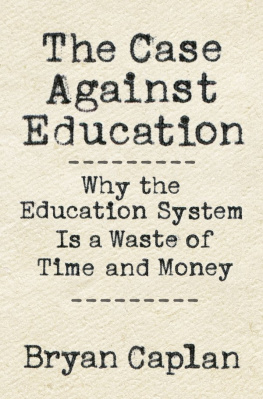




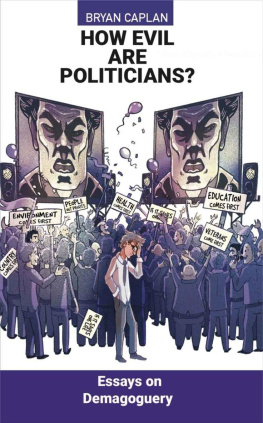

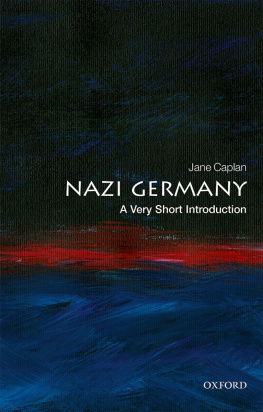
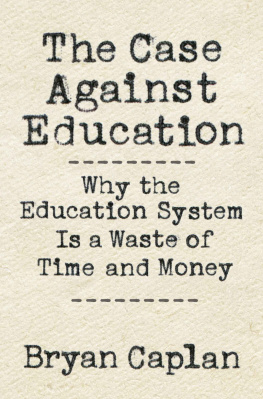
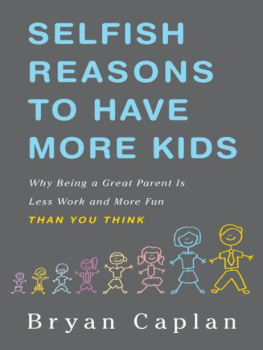
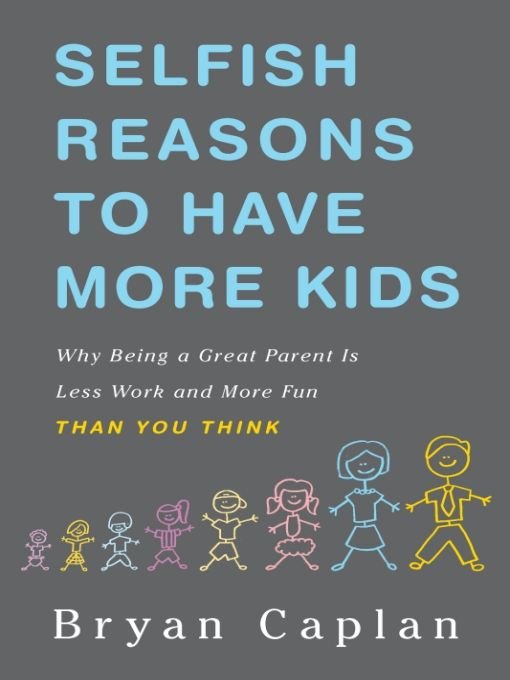
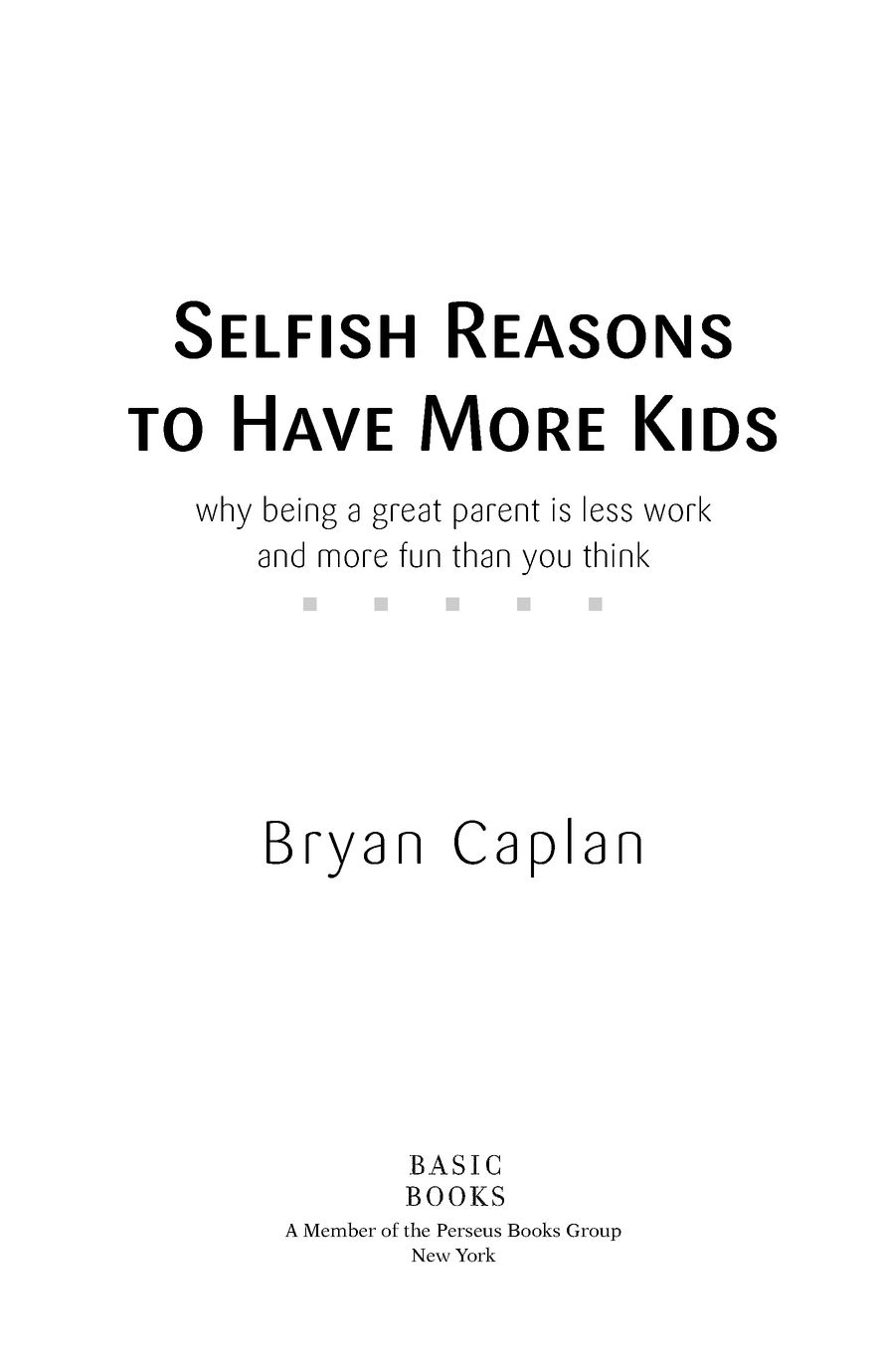
 First, parents can sharply improve their lives without hurting their kids. Nature, not nurture, explains most family resemblance, so parents can safely cut themselves a lot of additional slack.
First, parents can sharply improve their lives without hurting their kids. Nature, not nurture, explains most family resemblance, so parents can safely cut themselves a lot of additional slack.